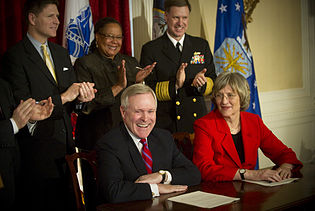
"Don't ask, don't tell" (DADT) was the official United States policy on military service of non-heterosexual people. Instituted during the Clinton administration, the policy was issued under Department of Defense Directive 1304.26 on December 21, 1993, and was in effect from February 28, 1994, until September 20, 2011. The policy prohibited military personnel from discriminating against or harassing closeted homosexual or bisexual service members or applicants, while barring openly gay, lesbian, or bisexual persons from military service. This relaxation of legal restrictions on service by gays and lesbians in the armed forces was mandated by Public Law 103–160, which was signed November 30, 1993. The policy prohibited people who "demonstrate a propensity or intent to engage in homosexual acts" from serving in the armed forces of the United States, because their presence "would create an unacceptable risk to the high standards of morale, good order and discipline, and unit cohesion that are the essence of military capability".
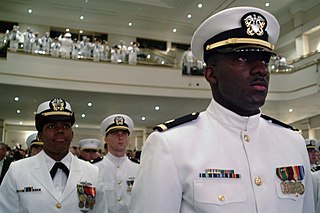
The Reserve Officer Training Corps is a group of college- and university-based officer-training programs for training commissioned officers of the United States Armed Forces.

Lawrence Henry Summers is an American economist who served as the 71st United States Secretary of the Treasury from 1999 to 2001 and as director of the National Economic Council from 2009 to 2010. He also served as president of Harvard University from 2001 to 2006, where he is the Charles W. Eliot university professor and director of the Mossavar-Rahmani Center for Business and Government at Harvard Kennedy School.

The Harvard Crimson is the student newspaper of Harvard University and was founded in 1873. Run entirely by Harvard College undergraduates, it served for many years as the only daily newspaper in Cambridge, Massachusetts. Beginning in the fall of 2022, the paper transitioned to a weekly publishing model.
Neil Leon Rudenstine is an American scholar, educator, and administrator. He served as president of Harvard University from 1991 to 2001.
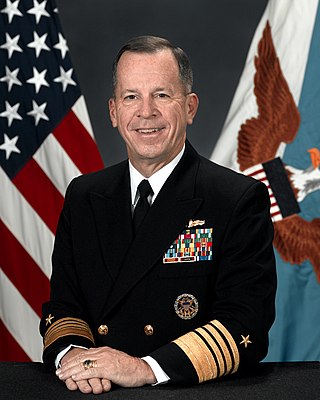
Michael Glenn Mullen is a retired United States Navy admiral, who served as the 17th chairman of the Joint Chiefs of Staff from October 1, 2007, to September 30, 2011.

Catharine Drew Gilpin Faust is an American historian who served as the 28th president of Harvard University, the first woman in that role. She was Harvard's first president since 1672 without an undergraduate or graduate degree from Harvard and the first to have been raised in the South. Faust is also the founding dean of the Radcliffe Institute for Advanced Study. She has been ranked among the world's most powerful women by Forbes, including as the 33rd most powerful in 2014.
The Military Readiness Enhancement Act was a bill introduced in the U.S. House of Representatives in several sessions between 2005 and 2009. It would have amended title 10, United States Code to include a policy of nondiscrimination on the basis of sexual orientation, replacing the policy known as "Don't ask, don't tell" (DADT), which banned disclosing one's homosexuality while serving in the Armed Forces.

Alan Greg Rogers was an ordained pastor, a U.S. Army major and intelligence officer, a civil rights activist in the gay, lesbian and bisexual military community and the first-known gay combat fatality of Operation Iraqi Freedom. The subsequent coverage of his death in the media sparked a debate over the effect of the military's "don't ask, don't tell" (DADT) policy and what information should be included in the biography of a gay military person killed in action.
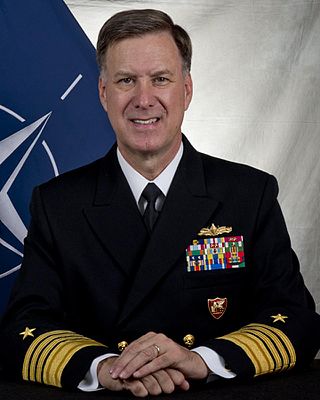
Mark E. Ferguson III is a retired United States Navy admiral who last served as Commander, United States Naval Forces Europe, United States Naval Forces Africa and Allied Joint Force Command Naples. Ferguson previously served as the 37th Vice Chief of Naval Operations from August 22, 2011 to July 1, 2014. Prior to that, he served as the 55th Chief of Naval Personnel and Deputy Chief of Naval Operations. He also served as chief of legislative affairs and assistant commander for distribution, Navy Personnel Command. He retired from active duty on July 1, 2016.
The United States Navy dog handler hazing scandal was a pattern of misconduct engaged in by members of the United States Navy at Naval Support Activity Bahrain between 2004 and 2006. Naval investigators documented nearly 100 incidents of abuse committed against several members of a Military Working Dog (MWD) unit stationed at the United States military base at Juffair. Documented incidents of abuse include racial intimidation, sexual harassment, physical abuse and anti-gay harassment. One sailor, Master-At-Arms 3rd Class Joseph Rocha, suffered post-traumatic stress disorder because of his abuse at the hands of fellow sailors, and he alleges that another sailor committed suicide because of her treatment. The Navy investigated the allegations in 2007 and documented the abuse, but took little substantive action. However, Pennsylvania Congressman Joe Sestak, a former Vice Admiral, demanded a new examination of the report's findings which led to the disciplining of Rocha's former superior, Chief Petty Officer Michael Toussaint. The scandal came to widespread public attention as United States President Barack Obama faced increased pressure to repeal the military's gay-exclusionary policy known as "don't ask, don't tell" (DADT).
The United States military formerly excluded gay men, bisexuals, and lesbians from service. In 1993, the United States Congress passed, and President Bill Clinton signed, a law instituting the policy commonly referred to as "Don't ask, don't tell" (DADT), which allowed gay, lesbian, and bisexual people to serve as long as they did not reveal their sexual orientation. Although there were isolated instances in which service personnel were met with limited success through lawsuits, efforts to end the ban on openly gay, lesbian, and bisexual people serving either legislatively or through the courts initially proved unsuccessful.

Log Cabin Republicans v. United States, 658 F.3d 1162 was a federal lawsuit challenging the constitutionality of 10 U.S.C. § 654, commonly known as don't ask, don't tell (DADT), which, prior to its repeal, excluded homosexuals from openly serving in the United States military. The Log Cabin Republicans (LCR), an organization composed of lesbian, gay, bisexual, and transgender (LGBT) Republicans, brought the suit on behalf of LCR members who serve or served in the military and were subject to DADT.

The Don't Ask, Don't Tell Repeal Act of 2010 is a landmark United States federal statute enacted in December 2010 that established a process for ending the "don't ask, don't tell" (DADT) policy, thus allowing gay, lesbian, and bisexual people to serve openly in the United States Armed Forces. It ended the policy in place since 1993 that allowed them to serve only if they kept their sexual orientation secret and the military did not learn of their sexual orientation, which was controversial.

Maria Zoe Dunning is a U.S. Naval Academy graduate and gay rights activist. She is known for being the only openly gay person remaining on active duty in the U.S. military after coming out. She was involved in a series of lawsuits against the U.S. military and the Don't Ask, Don't Tell policy during the 1990s.

United States military chaplains hold positions in the armed forces of the United States and are charged with conducting religious services and providing counseling for their adherents. As of 2011, there are about 2,900 chaplains in the Army, among the active duty, reserve, and National Guard components.
Joan Darrah is an activist for LGBT rights, specifically the end of the "don't ask don't tell" (DADT) policy, which prohibited gay, lesbian, and bisexual service members from being open about their sexual orientation.
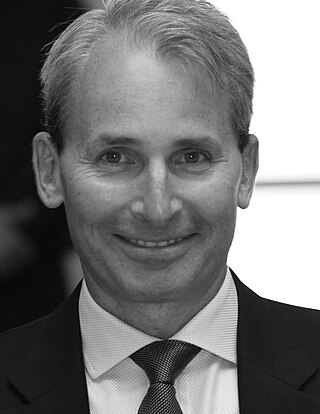
Philip M. Bilden is an American businessman and private equity & venture capital investor. He was nominated by President Donald Trump to serve as the 76th United States Secretary of the Navy in January, 2017, although he subsequently withdrew himself from consideration. He is a philanthropist and advocate for national security, the U.S. Navy, and cybersecurity.

The regulations regarding the service of intersex people in the United States Armed Forces are vague and inconsistent due to the broad nature of humans with intersex conditions. The United States Armed Forces as a whole does not officially ban intersex people from service but does exclude many based on the form of their status. Policies regarding all intersex people are not addressed formally although depending on the type of sex variation some intersex people are allowed to serve. The United States military and their requirements for service makes it so they are frequently in a unique predicament when it comes to intersex bodies. With their position of needing to discern between male and female bodies, they are exposed to a broad variety of people, such as those who are intersex whose bodies may not match either classification and are more difficult to make decisions on. This ambiguity leads to confusion regarding military medical, behavioral, and legal laws.
Columbia University in New York City, New York, has seen numerous instances of student protests, particularly beginning in the late 20th century.



